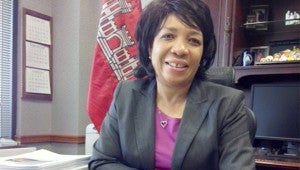Hemphill keeps commander, priorities in line
Published 10:43 am Friday, March 6, 2015

SETTING AN EXAMPLE: Pat Hemphill is the first African-American woman to be named the top civilian for the U.S. Army Corps of Engineers Vicksburg District. (Danny Barrett Jr. / The Vicksburg Post)
Behind every good commander at the Vicksburg District, there’s been a good deputy.
And now the lady that helps juggle Col. John W. Cross’ schedule of planning sessions, civic club appearances and more, presses on dutifully despite pressures at home.
“What surprised me here in a good way,” Pat Hemphill said in a rare break in her schedule. “Is that if you do the very best you can, and if you’re open and honest, the rest will come.”
Hemphill, 53, balances being deputy commander for programs, planning and project management — the District’s highest civilian position — with being a caretaker for her husband, Glen. At work, organizing the schedule itself might require meetings beforehand, such as how long to attend planning sessions at other Corps districts.
“So, I don’t have to be up there for the RPRB at Rock Island, do I?” Col. Cross asked upon entering the room. “I need to find out whether I go Monday or Tuesday.”
“I think you go Tuesday, but I’ll get with them and sort it out,” Hemphill replied.
The first African-American woman named the top civilian in the Vicksburg District was inspired to a life of engineering by a group of teachers that helped her cultivate a love of math.
“I thank Miss (Pat) Segrest, Miss (Tommie) Allen and Miss (Norma) Carter,” Hemphill said. “Two of the three are deceased, but I did get to thank them.”
“Self-awareness is OK,” she said of having multiple firsts attached to her tenure at the Corps. “I know I’m the first one, but I don’t want to be the last one. I’m here because I earned it. This just happened to be the body God put me in.”
Hemphill’s time at the Corps started as an afterschool job at Warren Central High School when District offices were still downtown. A supervisor in personnel noted her grades in math and science and encouraged her to stick around.
“He said, ‘You’re at the top of your class, you’re getting these great grades, you’re getting all these scholarships. Why don’t you come back and be one of our engineers?’”
“One of my first jobs in hydraulics was taking calls from the gauge readers,” Hemphill said. “It helped me develop that rapport with the people that make us an effective system. It just instilled that feeling of what can I do to serve and help.”
After undergraduate work at Jackson State University, Hemphill earned a bachelor’s in civil engineering from Mississippi State University. She attended JFK School of Government and the Army Management Staff College, and is a licensed professional engineer in the State of Mississippi.
In the early 2000s, Hemphill found herself at a crossroads in her career and what she wanted to do with it.
“I was really torn, because I really loved just doing the techy stuff. You know, let me play with my numbers and stay in my cube. But, there was a calling to do the people’s stuff,” Hemphill said.
By the time Hurricane Katrina battered the Gulf South, Hemphill was a deputy to the position she holds now. Her work coordinating volunteers for the response to the disaster won her a superior civilian service award from the Army and signed by now retired Brig. Gen. Robert Crear, who commanded the Corps’ Task Force Hope storm response operation.
“It was wide open in here for Katrina,” Hemphill said. “We processed maybe 4,000 to 5,000 people through here. They’d come in for safety briefings, they’d get their shots, then we’d send them on down.”
Less than six years later, a historic flood on the Mississippi River left her with an even stronger respect for the Corps’ mission.
“For the 2011 flood, we did a lot of flying, watching things from the sky between Natchez and Vicksburg,” Hemphill said. “It’s just this mass from here to there. And if you look at what we’re responsible for, you’ll see if that levee breaks, all these homes are going to be devastated. The crops, we know fields get wet and people take that risk into consideration when they plant there. A lot of homes are built on the protected side of the levee and they just don’t know about that wall of water that the earthen levee is protecting them from. So when we tell you to get out, you need to get out.”
Hemphill leans on Scripture and personal experience when asked to impart advice on young people with talent who need the same nudge to succeed she got so many years ago.
“Know thyself,” Hemphill said. “Seek direction and seek guidance. I couldn’t have done any of this without God. And ask people ‘Hey, can I come work with you a day and see what you do?’ And just discover things — it’s how you accidentally walk into your calling.
“Look at your gifts and figure out how to get paid to do it.”





